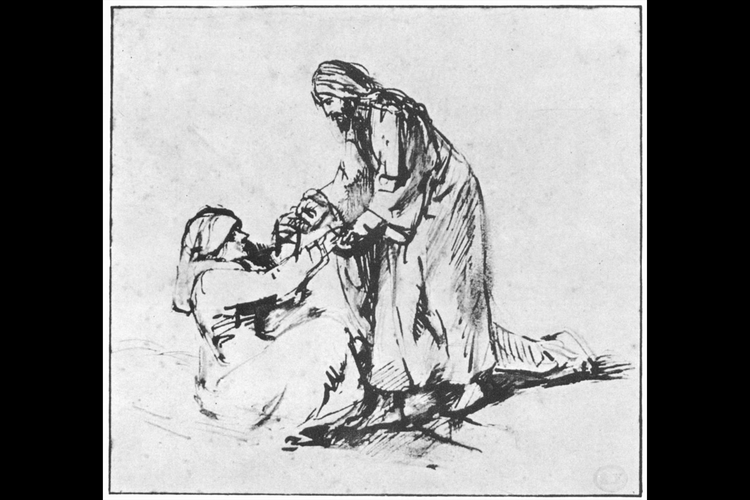A Reflection for the Fifth Sunday in Ordinary Time
Readings: Job 7:1-4, 6-7 1 Corinthians 9:16-19, 22-23 Mark 1:29-39
As skipper of the Wahoo, a submarine newly commissioned in 1941, Lieutenant Commander Dudley W. Morton rewrote expectations for submersibles in the Second World War. The U.S. Navy had previously valued them as scouting craft, but that changed in February 1943, when the Wahoo returned to Pearl Harbor, sporting eight Rising Sun flags on one of her signal halyards. Five of those ships, totaling 32,000 tons, had been sunk on that cruise alone.
The Wahoo’s captain and crew were focused warriors, but, as Ian W. Toll records in The Conquering Tide (2015), the second of his engrossing three-volume The Pacific War History, earlier in the cruise,
[t]he boat crossed the equator (crossed under it, as she was running submerged), and Morton insisted on a proper observance of the ancient line-crossing rites. Naval tradition of many centuries required all “polliwogs,” those officers and enlisted men who had not previously crossed the line, to be inducted into the “Court of King Neptune.” A riotous ceremony was held in the forward battery. Pappy Rau, chief of the boat and veteran of more than twenty years, was done up as King Neptune. He wore Morton’s red bathrobe, a gold cardboard crown, and fake beard, and he held a trident fashioned from a wooden broom handle. Another sailor played the role of the “royal baby,” wearing only a large “diaper”—actually a towel held together by safety pins. The inductees, beginning with Lieutenant Grider, were required to answer a series of preposterous and insulting questions, then forced to choke down a disgusting potion scrounged from the gallery, and given an electric shock. Grider’s head was shaved, much to his chagrin. He was forced to bow low and kiss Rau’s belly, which had previously been greased with lard and lampblack. At the end of all that, he could call himself a “shellback” and be placated by the knowledge that no man ever had to suffer those indignities twice.
So much changes when a sea vessel crosses the equator! The fixed points of navigation shift, as do the constellations and the drift of the seasons. No wonder that sailors have felt a need to mark the moment when the world turns upside down.
Something like that happens in life as well. There is a day—though we can mark it only in hindsight and with some reflection—when we cross a boundary in our own biographies. From that day on, the best of life lies behind us. Of course, there will be joys and achievements to come—it would be hard to go on if there were not—but those who are honest can admit that their best days lie behind. Those things they sought in life have followed a preordained course and begun to wane. All things pass, including the best of us.
That is Job’s melancholy mood:
My days are swifter than a weaver’s shuttle;
they come to an end without hope.
Remember that my life is like the wind;
I shall not see happiness again (7:6-7).
Something would be wrong with a young person who felt like Job. And there would be something foolish about an older person who could not join Job’s lament. God is ever ancient, ever new, ever the same, but we were created to wax and to wane.
Something would be wrong with a young person who felt like Job. And there would be something foolish about an older person who could not join Job’s lament.
Some of the saints quickly shed their youthful delight in this world. The Good Lord granted them an early sip of eternity’s elixir. But most of us grow more religious as we age. We sense that we have long passed a midway point in life. We know that the next boundary will carry us beyond life. We are finally ready to encounter the Christ of St. Mark’s Gospel. He is the spark of eternity let loose in the fields of time. Christ is the fulfillment of the implausible promises made by the prophets. He is the new covenant, the new heart of flesh and the wilderness in bloom. In him youth is renewed like the eagle. Christ turns the world upside-down.
“Simon’s mother-in-law lay sick with a fever” (1:30). This is the way of life. We cross the equator. We no longer care for the young; they care for us. We can only conjecture about the junction Simon Peter’s mother-in-law had reached. We do not know what she made of her sickness. But St. Mark leaves no doubt about the effect God’s tonic, our Christ, had upon her.
He approached, grasped her hand, and helped her up.
Then the fever left her and she waited on them (1:31).
Remember, none of the evangelists—certainly not St. Mark—simply report past events. They want us to learn from the lessons they record. Here, a woman in decline encounters Jesus, and she becomes a disciple who serves.
Who is this Christ? And what might it mean for us to truly encounter him? Learn a lesson from that valiant submarine, the Wahoo. When the world turns upside-down, we need to pause, recalculate and enter the second half of the journey with joy.








